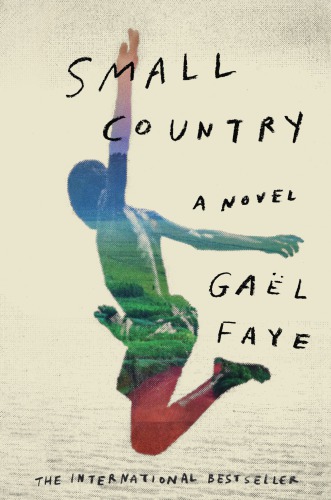
Small Country
A Novel
کتاب های مرتبط
- اطلاعات
- نقد و بررسی
- دیدگاه کاربران
نقد و بررسی

Starred review from April 30, 2018
Faye debuts a precise and potent voice in his deeply affecting novel about coming of age during the mid-1990s Tutsi genocide. Ten-year-old Gabriel has a peaceful, mischievous childhood marred only by the growing rift between his French father and Rwandan mother. He and his friends roam the streets of their well-heeled neighborhood in the Burundi capital of Bujumbura, stealing mangos and avoiding the bully Francis; Gabriel daydreams about moving to France to be with his pen pal crush Laure. But then Burundi’s first democratic elections in 1993 sputter into a military coup, while rumors of impending civil war across the border in Rwanda stoke ethnic tensions among Gabriel’s peers and the entire city. Gabriel’s mother crosses the border to seek news of her Tutsi family and returns traumatized; Gabriel retreats into voracious reading as his friends get involved with guerrilla warfare. Faye includes a range of individuals representing the economic and racial complexities of postcolonial Africa. The most powerful moments come as Gabriel stumbles through processing his alarming new realities with delayed understanding. The juxtaposition of everyday growing pains and the fallout from atrocities is heightened by Faye’s lovely prose, which builds a heartrending portrait of the end of childhood.

May 15, 2018
Faye's debut tells the story of Gabriel, a preteen boy in mid-1990s Burundi when violence from the Rwandan genocide spills over the border.Gabriel wishes he were elsewhere. The social fabric is deteriorating around him. But staying home and reading does not slow the pace of his losses. His mother goes to Rwanda to try to save her Tutsi family members, while his French father stays home to look after the children. Eventually, the killing that was kept at arm's length comes to their street, and Gabriel loses almost everything. Though the situation is rich, it does not become so until about midway through the book. The first half is all calm before the storm: tiffs with other boys, a pen-pal crush, playing and getting into mischief outdoors. Life meanders along without tension or stakes. This might have worked if the language were particularly powerful or evocative. It is not. Awkward phrases Faye (or translator Ardizzone) uses, such as "footsteps to-ing and fro-ing" or "parched flamboyant tree," don't help. The book is not without strong points, including a wonderful paragraph toward the end about a murder that happens in broad daylight as people continue to go about their days. It's a pity the story does not start closer to these events and the language is not as strong throughout.Faye provides an interesting window into Burundi and a reminder of the specious logic and horrific cost of treating others like vermin.
COPYRIGHT(2018) Kirkus Reviews, ALL RIGHTS RESERVED.

Starred review from June 1, 2018
French hip-hip artist and debut novelist Faye's semiautobiographical tale of 10-year-old Gabriel and his family living through the turmoil in Burundi and Rwanda in the early 1990s explores the classic themes of home and identity overlaid with the horrors of genocide and fleeing refugees. Yvonne, Gabriel's mother, is a Tutsi from Rwanda married to a Frenchman, Michel, in a union that embodies the complex conflicts underpinning colonial relationships. Faye's look at the slow poisoning of minds as some groups are designated as Other offers a close-up of the beast that is mob mentality. The ghastliness of news headlines comes alive in Gabriel and his younger sister Ana's flight from Burundi to France and personalizes the Rwandan genocide and the life of the Rwandan refugees. The Tutsi-Hutu violence, the notion of identity to a biracial child, and the impossible choices of those living in troubled territories are all explored in a straightforward style befitting a young narrator. Vividly translated by Ardizzone, this powerful tale, a best-seller overseas, presents a world where there are no easy demarcations of good and evil, sane and insane, or pure and corrupted, as Faye focuses not on offering judgement but rather on capturing the full impact of social and political disintegration.(Reprinted with permission of Booklist, copyright 2018, American Library Association.)

April 15, 2018
The death of innocence seen through the eyes of Gabriel, our beguiling 11-year-old narrator, is at the heart of this gorgeous first novel, which earned the Prix Goncourt des lyc�ens in France. A mixed-race child, with a French father and a Rwandan mother, Gaby lives in idyllic surroundings. With his posse of friends and his sister, Ana, he joyfully roams the neighborhood on his bike, sneaks cigarettes in an abandoned minivan, and steals lush mangos to sell for mad money. But Gaby is also a precocious observer and avid reader, curious about the larger world outside the small East African nation of Burundi. In 1993, when the first democratically elected president is assassinated, Gabriel's friends suddenly see differences between the Hutu and Tutsi neighbors with whom they've interacted all their lives, exhorting a reluctant Gabriel to choose a side. As the world he's known disintegrates around him, Gabriel escapes from reality by finding comfort in books, until the horrors of genocide ravage his own family and he can no longer look away. VERDICT Echoing the work of Ishmael Beah, first novelist Faye eloquently speaks to the untenable choices, among love of country, family, or survival, that victims in conflict zones are forced to make. [See Prepub Alert, 12/11/17.]--Sally Bissell, formerly with Lee Cty. Lib. Syst., Fort Myers, FL
Copyright 2018 Library Journal, LLC Used with permission.

April 15, 2018
Young Gabriel's life in Burundi is upended when adjacent Rwanda erupts hideously in flames. Based on songwriter/rapper Faye's own experiences, this debut novel captured numerous awards in France and has been sold to 30 territories.
Copyright 2018 Library Journal, LLC Used with permission.

























دیدگاه کاربران